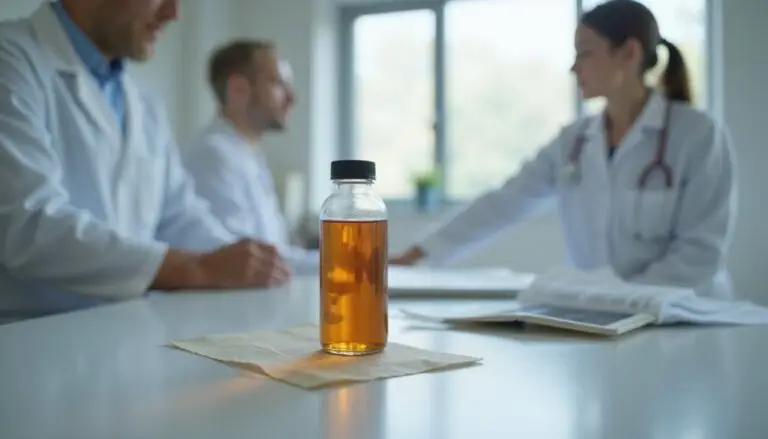Mindfulness-based therapy builds emotional resilience in addiction recovery by teaching you to observe cravings and difficult emotions without automatically reacting to them. Through techniques like “urge surfing” and mindful breathing, you’ll develop the emotional regulation skills that many people lack when entering recovery. Clinical evidence shows mindfulness interventions reduce relapse rates by 42% and improve treatment retention by strengthening your cognitive control and self-awareness. These evidence-based approaches offer transformative strategies for lasting recovery success.
How Mindfulness Transforms Emotional Awareness and Regulation in Recovery
The trek through addiction recovery demands more than willpower; it requires developing sophisticated emotional skills that many people never learned. Mindfulness training transforms how you experience and respond to emotions by increasing awareness of current emotional states without immediate reaction. This nonjudgmental observation helps you recognize emotion-driven motivation before it leads to destructive choices.
Through regular practice, you’ll develop accuracy in emotional self-recognition, essential for managing high-risk situations. Mindfulness supports behavioral habit disruption by encouraging “decentering”, viewing emotions as temporary experiences rather than defining traits. Research shows mindfulness-based interventions considerably improve emotion regulation in addiction recovery populations, with experimental groups reporting measurable improvements compared to controls. Clinical studies demonstrate that participants receiving eight MBRP sessions show significantly better outcomes in both craving reduction and emotional stability compared to those receiving no intervention. Studies reveal that marginalized individuals may experience even greater benefits from mindfulness-based interventions compared to traditional cognitive-behavioral approaches. You’ll learn reappraisal techniques, consciously reframing emotional triggers to reduce negative reactions and impulsive responses. Advanced practitioners can transition from seeking hedonic pleasure to experiencing deeper forms of emotional satisfaction and self-transcendence.
Breaking the Craving Cycle: Mindfulness Strategies for Relapse Prevention
Building emotional awareness through mindfulness creates the foundation you need to tackle one of recovery’s most persistent challenges: the craving cycle itself. When cravings hit, your brain’s prefrontal cortex, responsible for craving-related decision-making, often becomes overwhelmed by intense urges. Mindfulness techniques like urge surfing teach you to observe these sensations without automatically reacting.
Research demonstrates that consistent mindfulness practice promotes neuroplasticity and craving reduction by strengthening cognitive control pathways. You’ll learn to recognize cravings as temporary experiences rather than commands requiring action. Techniques like mindful breathing and body scans interrupt the automatic cycle linking urges to substance use. This approach directly addresses the three-stage cycle of addiction: preoccupation/anticipation, binge/intoxication, and withdrawal/negative affect.
Studies show mindfulness-based interventions substantially reduce both craving intensity and relapse rates. Researchers at the University of Washington have conducted pilot efficacy trials specifically examining mindfulness-based relapse prevention for substance use disorders. MBRP works best as an aftercare program for individuals who have already completed initial treatment phases. By practicing non-judgmental observation daily, you’re rewiring your brain’s response patterns, creating sustainable recovery pathways.
Clinical Evidence Supporting Mindfulness-Based Interventions for Substance Use Disorders
While individual experiences with mindfulness may vary, extensive clinical research provides compelling evidence for its effectiveness in addiction recovery. A systematic review of 34 randomized controlled trials found that mindfulness-based interventions produced considerably greater improvements in substance use, stress, and craving outcomes compared to controls.
The research shows a particularly strong impact on dual diagnoses; 87% of depressed stimulant-dependent participants receiving mindfulness training achieved abstinence at 12 weeks, compared to 62% receiving standard care. Studies consistently report improved treatment adherence and retention alongside reduced cravings and increased self-efficacy.
Mindfulness-Based Relapse Prevention teaches participants to direct attention to present-moment experiences, helping them tolerate discomfort without turning to substance use during critical recovery periods. These interventions strengthen cognitive control by exercising the same neurocognitive processes that become dysregulated in addiction. Research has demonstrated that these practices can actually change brain structures associated with self-awareness and emotion regulation, providing biological evidence for the lasting effects of mindfulness training.
| Outcome Measure | Effect Size Range |
|---|---|
| Substance Use Reduction | Cohen’s d = 0.33-1.12 |
| Craving Reduction | OR up to 3.15 |
| Stress Management | Small to Large |
| Follow-up Maintenance | Superior to Controls |
Enhancing Cognitive Flexibility and Self-Awareness Through Mindful Practice
Breaking free from addiction’s rigid patterns requires rewiring the very neural pathways that drive automatic, compulsive behaviors. Mindfulness practice strengthens your brain’s capacity for cognitive flexibility by augmenting functional connectivity between prefrontal regions and striatal circuits. You’ll develop greater attentional stability and set-shifting abilities, allowing you to consciously interrupt conditioned responses to triggers and cravings.
Through cultivating metacognitive capacity, you gain the ability to observe your thoughts and urges without being controlled by them. This amplified self-awareness enables you to identify physiological signals related to cravings and reappraise negative associations. Mindfulness disrupts automatic action schemas, facilitating behavioral change by creating space between stimulus and response. You’ll access new cognitive strategies and perspectives, improving your context-sensitive decision-making and developing adaptive coping skills for triggering situations. Urge surfing allows you to ride out cravings by observing them as temporary waves that naturally rise and fall without requiring action. Practicing self-kindness during inevitable setbacks becomes crucial for maintaining momentum in your recovery journey. Additionally, mindfulness practice helps restore sensitivity to natural rewards that addiction has diminished, rebalancing your brain’s reward processing systems.
Improving Treatment Engagement and Long-Term Recovery Success With Mindfulness Programs
Although addiction treatment programs traditionally focus on abstinence and behavioral modification, research demonstrates that integrating mindfulness practices greatly improves both your engagement with treatment and your chances of sustained recovery. Mindfulness-Oriented Recovery Enhancement reduces program dropout rates by 59%, substantially increasing retention rates compared to standard approaches. When you participate in mindfulness-based interventions, you’re more likely to complete treatment and maintain long-term engagement, especially when addressing psychological symptoms like depression that often co-occur with addiction.
The benefits extend beyond initial treatment completion. You’ll experience a 42% reduction in relapse rates when mindfulness training accompanies standard care. These programs teach you to tolerate cravings without acting on them, while meta-analyses consistently show meaningful reductions in substance use across alcohol, tobacco, stimulant, and opioid addictions. Additionally, patients who received MORE reported a 10 percent reduction in pain, which is particularly valuable since chronic pain is often associated with opioid use disorder. Mindfulness-based approaches promote awareness and acceptance, helping you develop the ability to observe your inner experiences without judgment while building tolerance for uncomfortable experiences.
Frequently Asked Questions
How Long Does It Take to See Results From Mindfulness-Based Addiction Therapy?
You’ll typically notice early improvements in cravings and stress within 2-4 weeks of starting mindfulness-based addiction therapy. However, your individual progress rates depend on consistent practice duration and baseline symptoms. Most significant behavioral changes, like sustained abstinence and relapse prevention, develop over 8-12 weeks with continued practice. You’re most likely to see lasting recovery benefits at 3-4 month follow-ups, especially if you maintain regular mindfulness practice post-treatment.
Can Mindfulness Therapy Be Combined With Medication-Assisted Treatment for Opioid Addiction?
Yes, you can safely combine mindfulness therapy with medication-assisted treatment for opioid addiction. Research shows no negative interactions between these approaches, and they actually complement each other well. Your medication dosage adjustments won’t be affected by mindfulness practice, and you can maintain your regular counseling session frequency while adding mindfulness components. This combination markedly reduces cravings, anxiety, and depression while your medication addresses physiological dependence, creating an all-encompassing recovery approach.
What Are the Potential Side Effects or Risks of Mindfulness-Based Interventions?
You should be aware that mindfulness interventions carry potential contraindications, especially if you have a trauma history or severe psychiatric conditions. You might experience negative emotional responses like increased anxiety, panic, or resurfacing traumatic memories during practice. Physical side effects can include headaches, sleep disturbances, or fatigue. Without proper therapist supervision, you’re at higher risk for adverse outcomes. You must work with qualified professionals who can monitor your response and integrate mindfulness appropriately.
How Much Does Mindfulness-Based Addiction Treatment Typically Cost Without Insurance Coverage?
Without insurance, you’ll typically pay $2,000-$10,000 for outpatient mindfulness-based addiction treatment, while residential programs range from $6,000-$20,000 monthly. However, you don’t have to face these costs alone. Many providers offer sliding scale costs based on your income, and financial assistance programs through nonprofits, grants, or state funding can considerably reduce expenses. Payment plans also help spread costs over several months, making treatment more accessible.
Is Mindfulness Therapy Effective for People With Co-Occurring Mental Health Disorders?
Evidence shows mindfulness therapy can help with symptom management for co-occurring mental health disorders, though research specifically targeting dual diagnoses remains limited. You’ll likely benefit from structured, teacher-led programs lasting eight weeks or longer. While studies demonstrate effectiveness for depression, anxiety, and stress reduction, evidence for relapse prevention in dual-diagnosis populations needs strengthening. You should consider mindfulness as part of ideal treatment alongside existing therapies for complete outcomes.





